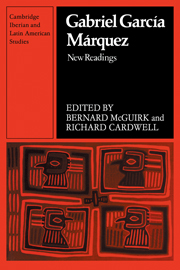Book contents
- Frontmatter
- Contents
- Note on the translations
- List of contributors
- Introduction
- 1 Characterization in the early fiction of Gabriel García Márquez
- 2 Beware of gift-bearing tales: reading ‘Baltazar's Prodigious Afternoon’ according to Marcel Mauss
- 3 The body as political instrument: communication in No One Writes to the Colonel
- 4 Magical realism and the theme of incest in One Hundred Years of Solitude
- 5 Translation and genealogy: One Hundred Years of Solitude
- 6 The humour of One Hundred Years of Solitude
- 7 On ‘magical’ and social realism in García Márquez
- 8 Aspects of narrative structure in The Incredible and Sad Story of the Innocent Eréndira and her Heartless Grandmother
- 9 Language and power in The Autumn of the Patriarch
- 10 Writing and ritual in Chronicle of a Death Foretold
- 11 Free-play of fore-play: the fiction of non-consummation: speculations on Chronicle of a Death Foretold
- 12 A prospective post-script : apropos of Love in the Times of Cholera
- The solitude of Latin America: Nobel address 1982
- Select bibliography
- Index
2 - Beware of gift-bearing tales: reading ‘Baltazar's Prodigious Afternoon’ according to Marcel Mauss
Published online by Cambridge University Press: 05 November 2011
- Frontmatter
- Contents
- Note on the translations
- List of contributors
- Introduction
- 1 Characterization in the early fiction of Gabriel García Márquez
- 2 Beware of gift-bearing tales: reading ‘Baltazar's Prodigious Afternoon’ according to Marcel Mauss
- 3 The body as political instrument: communication in No One Writes to the Colonel
- 4 Magical realism and the theme of incest in One Hundred Years of Solitude
- 5 Translation and genealogy: One Hundred Years of Solitude
- 6 The humour of One Hundred Years of Solitude
- 7 On ‘magical’ and social realism in García Márquez
- 8 Aspects of narrative structure in The Incredible and Sad Story of the Innocent Eréndira and her Heartless Grandmother
- 9 Language and power in The Autumn of the Patriarch
- 10 Writing and ritual in Chronicle of a Death Foretold
- 11 Free-play of fore-play: the fiction of non-consummation: speculations on Chronicle of a Death Foretold
- 12 A prospective post-script : apropos of Love in the Times of Cholera
- The solitude of Latin America: Nobel address 1982
- Select bibliography
- Index
Summary
Jésus se f^t obstinément refusé à faire des prodiges que la foule en eût créé pour lui; le plus grand miracle eût été qu'il n'en fît pas; jamais les lois de l'histoire et de la psychologie populaire n'eussent subi une plus forte dérogation. Les miracles de Jésus furent une violence que lui fit son siècle, une concession que lui arracha la nécessité passagère. Aussi l'exorciste et le thaumaturge sont tombés; mais le réformateur religieux vivra éternellement.
(Ernest Renan, Vie de Jésus)Speaking of the main task of his Essai sur le don (1925), Marcel Mauss says that he intends ‘to catch the fleeting moment when a society and its members take emotional stock of themselves and their situation as regards others’. In the wake of recent structuralist complexities Mauss's words appear forthright and endowed with a kind of naive authority. Of particular interest is his emphasis on emotions and feelings as pre-eminent objects of analysis. In The Gift, Mauss rebuilt an instance of social being which was significant in that it seemed to be total and, in spite of its aberrant display of excess and waste, practical. He saw the act of gift-exchange, or total presentation, as that juncture in time and space where structure and event intercept each other. As an object of story-telling, the group becomes, it begins at such a moment: social reality originates as kairos, as an occasion overruled by its own disclosures.
- Type
- Chapter
- Information
- Gabriel García MárquezNew Readings, pp. 17 - 32Publisher: Cambridge University PressPrint publication year: 1987



